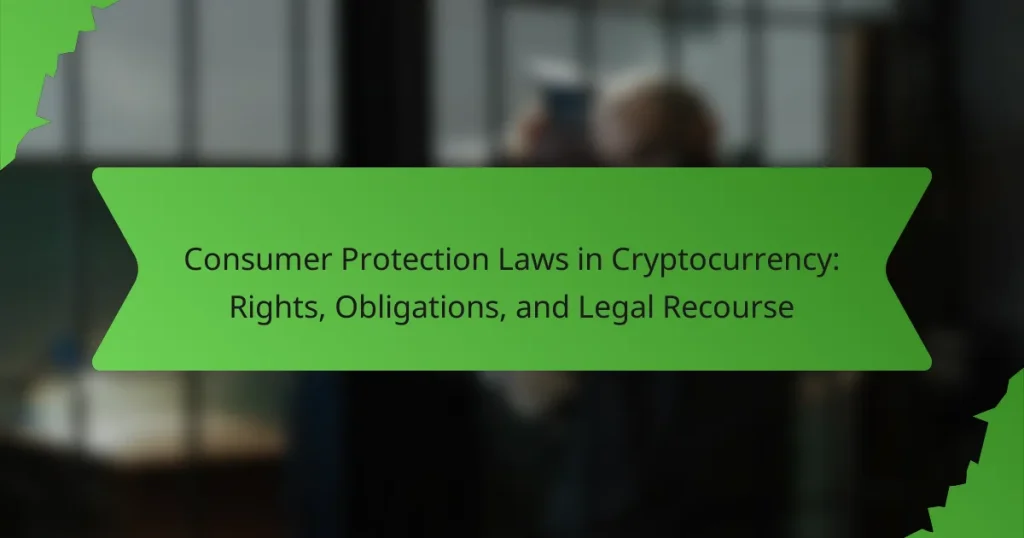Consumer protection laws in cryptocurrency are essential regulations aimed at safeguarding individuals involved in digital currency transactions. These laws ensure transparency, fairness, and security, addressing issues such as fraud prevention and the protection of personal information. Key regulatory frameworks include the U.S. Federal Trade Commission’s enforcement against deceptive practices and the European Union’s Markets in Crypto-Assets Regulation, which collectively enhance consumer trust in the cryptocurrency market. Despite these protections, consumers face challenges due to the decentralized nature of cryptocurrencies, regulatory inconsistencies, and a lack of understanding of complex legal frameworks, which complicate their ability to assert rights and access legal recourse.

What are Consumer Protection Laws in Cryptocurrency?
Consumer protection laws in cryptocurrency are regulations designed to safeguard consumers engaging in cryptocurrency transactions. These laws aim to ensure transparency, fairness, and security in the digital currency market. They cover issues such as fraud prevention, disclosure of risks, and the protection of personal information. For example, the U.S. Federal Trade Commission (FTC) enforces laws against deceptive practices in cryptocurrency advertising. Additionally, the European Union’s Markets in Crypto-Assets Regulation (MiCA) seeks to create a comprehensive regulatory framework for cryptocurrency assets, enhancing consumer protection. These laws help to build trust and promote a safer environment for cryptocurrency users.
How do these laws apply to cryptocurrency transactions?
Consumer protection laws apply to cryptocurrency transactions by ensuring transparency and fairness in exchanges. These laws require cryptocurrency platforms to disclose risks and fees associated with transactions. They also mandate that consumers have access to accurate information about the cryptocurrencies they are purchasing. Additionally, these laws protect consumers from fraudulent activities and misleading advertising. In many jurisdictions, these protections extend to digital assets, treating them similarly to traditional financial products. For instance, the Federal Trade Commission (FTC) enforces regulations against deceptive practices in the cryptocurrency market. This ensures that consumers can seek recourse in case of disputes or fraud.
What are the key components of consumer protection laws in this context?
Key components of consumer protection laws in cryptocurrency include disclosure requirements, fraud prevention measures, and dispute resolution mechanisms. Disclosure requirements mandate that companies provide clear information about their products and services. This ensures consumers understand the risks associated with cryptocurrency investments. Fraud prevention measures aim to protect consumers from scams and misleading practices in the market. These measures may include registration and licensing of cryptocurrency exchanges. Dispute resolution mechanisms offer avenues for consumers to seek redress in case of grievances. These components work together to create a safer environment for consumers engaging with cryptocurrency.
How do these laws differ from traditional consumer protection laws?
Consumer protection laws in cryptocurrency differ from traditional consumer protection laws primarily in their scope and regulatory framework. Traditional laws focus on physical goods and established services, while cryptocurrency laws address digital assets and blockchain technology.
Cryptocurrency laws often prioritize transparency and security in decentralized systems. They may include specific provisions for digital transactions and smart contracts, which are not covered by traditional laws.
Additionally, enforcement mechanisms can vary significantly. Traditional consumer protection laws typically involve regulatory bodies that oversee compliance. In contrast, cryptocurrency laws may rely on self-regulation and community governance.
These differences arise from the unique challenges posed by digital currencies, such as anonymity and cross-border transactions. As a result, regulatory approaches must adapt to these evolving landscapes.
What rights do consumers have under these laws?
Consumers have specific rights under consumer protection laws in cryptocurrency. These rights include the right to clear and accurate information about cryptocurrency products. Consumers are entitled to protection against deceptive practices and fraud. They have the right to receive refunds or exchanges for defective products. Additionally, consumers can report violations to regulatory authorities. These rights are designed to ensure transparency and fairness in the cryptocurrency market. Legal recourse is available if these rights are violated. Consumers can seek compensation for losses incurred due to breaches of these laws.
What specific protections are offered to cryptocurrency consumers?
Cryptocurrency consumers are offered several specific protections under various regulations. These protections include the right to transparent information about transactions and fees. Consumers are also protected from fraud and deceptive practices through laws like the Anti-Money Laundering (AML) and Know Your Customer (KYC) regulations. Additionally, many jurisdictions require cryptocurrency exchanges to maintain funds in segregated accounts, ensuring consumer assets are safeguarded. In cases of unauthorized transactions, consumers may have the right to dispute and seek refunds. Regulatory bodies may also provide avenues for filing complaints against exchanges or service providers. These protections aim to enhance consumer confidence and promote fair practices within the cryptocurrency market.
How can consumers assert their rights effectively?
Consumers can assert their rights effectively by understanding their legal protections and taking proactive steps. They should familiarize themselves with consumer protection laws relevant to cryptocurrency. This includes knowing their rights regarding fraud, misrepresentation, and data privacy.
Consumers can document all transactions and communications with cryptocurrency platforms. They should keep records of agreements, receipts, and any issues encountered. Reporting grievances to regulatory bodies is essential. In the U.S., consumers can contact the Federal Trade Commission (FTC) or the Consumer Financial Protection Bureau (CFPB).
Joining consumer advocacy groups can provide additional support and resources. Educating themselves about common scams and fraudulent practices is crucial. Taking these actions enhances their ability to navigate disputes effectively.
What obligations do cryptocurrency businesses have?
Cryptocurrency businesses have several obligations to ensure compliance with regulations and protect consumers. They must adhere to anti-money laundering (AML) and know your customer (KYC) regulations. This involves verifying the identities of their clients to prevent illicit activities. Additionally, they are required to maintain transparent communication about fees and risks associated with their services.
Cryptocurrency businesses must also implement robust security measures to protect user data and assets. This includes safeguarding against hacking and fraud. They are obligated to provide clear terms of service and privacy policies to inform users of their rights. Furthermore, in many jurisdictions, they must report suspicious transactions to regulatory authorities.
These obligations are essential for fostering trust and accountability in the cryptocurrency market. Non-compliance can lead to severe penalties, including fines and legal actions.
What are the compliance requirements for businesses operating in this space?
Businesses operating in the cryptocurrency space must comply with various regulations. These include anti-money laundering (AML) and know your customer (KYC) requirements. Compliance with these laws helps prevent illicit activities. Additionally, businesses must adhere to consumer protection laws. These laws safeguard users against fraud and ensure transparency. Regulatory bodies often require regular reporting and audits. Non-compliance can lead to significant penalties and loss of operating licenses. The Financial Action Task Force (FATF) provides guidelines that many jurisdictions follow. Compliance is essential for maintaining trust and legitimacy in the cryptocurrency market.
How do these obligations impact consumer trust and safety?
Consumer protection obligations significantly enhance consumer trust and safety in cryptocurrency. These obligations require businesses to provide transparent information about risks and fees. When consumers are informed, they can make better decisions. Compliance with regulations also minimizes fraudulent activities. This leads to a safer trading environment for users. As a result, consumer confidence increases in the cryptocurrency market. Studies show that trust in regulated environments leads to higher participation rates. Therefore, robust consumer protection laws are essential for fostering trust and ensuring safety in cryptocurrency transactions.

What legal recourse is available to consumers?
Consumers have several legal recourses available to them. They can file complaints with regulatory agencies such as the Federal Trade Commission (FTC) or the Consumer Financial Protection Bureau (CFPB). Additionally, consumers may pursue civil lawsuits against companies for fraud or breach of contract. Class action lawsuits are also an option if multiple consumers are affected by the same issue. Consumers can seek refunds or damages through mediation or arbitration processes. Furthermore, they can report companies to state attorney generals for violations of consumer protection laws. Legal recourse options vary by jurisdiction and specific circumstances of the case.
How can consumers seek redress for violations of their rights?
Consumers can seek redress for violations of their rights through various legal channels. They can file complaints with consumer protection agencies. These agencies investigate complaints and can mediate disputes. Consumers may also pursue claims in small claims court. This option is available for disputes involving smaller amounts of money. Additionally, consumers can seek assistance from legal aid organizations. These organizations provide guidance on legal rights and options. Consumers should document all interactions related to the violation. This documentation serves as evidence in any legal proceedings. Understanding consumer protection laws is crucial for effective redress.
What steps should consumers take to file a complaint?
Consumers should follow specific steps to file a complaint effectively. First, gather all relevant documentation related to the issue. This includes receipts, transaction records, and any correspondence. Next, identify the appropriate regulatory body or consumer protection agency. For cryptocurrency complaints, this may be the Financial Crimes Enforcement Network (FinCEN) or the Federal Trade Commission (FTC).
Then, submit a formal complaint through the agency’s designated channels, such as online forms or written submissions. Be clear and concise in describing the issue and include all supporting evidence. After filing, keep a record of your complaint and any responses received. Follow up if necessary to ensure your complaint is being addressed.
These steps are crucial for ensuring that your complaint is taken seriously and processed efficiently.
What are the potential outcomes of pursuing legal action?
The potential outcomes of pursuing legal action include financial compensation, injunctions, or declaratory judgments. Financial compensation may cover damages incurred due to violations of consumer protection laws. Injunctions can prevent further illegal actions by the offending party. Declaratory judgments clarify the legal rights of the parties involved. Each outcome varies based on case specifics and jurisdiction. Successful legal action often leads to increased accountability within the cryptocurrency industry. Statistics show that legal recourse can significantly influence compliance with consumer protection laws.
What role do regulatory bodies play in enforcement?
Regulatory bodies play a crucial role in enforcing consumer protection laws in cryptocurrency. They establish guidelines and standards that businesses must follow. These entities monitor compliance with legal requirements. They investigate complaints from consumers regarding unfair practices. Regulatory bodies can impose penalties on non-compliant companies. They also provide education to consumers about their rights. Their enforcement actions help maintain market integrity. For example, the U.S. Securities and Exchange Commission (SEC) actively regulates cryptocurrency exchanges to protect investors.
How do these agencies monitor compliance with consumer protection laws?
Agencies monitor compliance with consumer protection laws through various methods. They conduct regular audits and inspections of businesses. These audits assess adherence to legal standards. Agencies also analyze consumer complaints and reports. They may investigate alleged violations based on these complaints. Additionally, agencies collaborate with other regulatory bodies. This collaboration enhances oversight and enforcement efforts. Data analytics tools are often employed to identify patterns of non-compliance. These methods ensure that businesses uphold consumer rights effectively.
What actions can regulatory bodies take against violators?
Regulatory bodies can take several actions against violators of consumer protection laws in cryptocurrency. They may impose fines as a financial penalty for non-compliance. Additionally, they can revoke licenses granted to cryptocurrency businesses. This action prevents violators from operating legally. Regulatory bodies may also initiate legal proceedings to seek injunctions against harmful practices. They can require restitution for affected consumers, ensuring victims are compensated. Furthermore, they often issue warnings or cease-and-desist orders to prevent further violations. These actions are supported by laws such as the Dodd-Frank Act, which empowers agencies to protect consumers in financial markets.

What challenges do consumers face in protecting their rights?
Consumers face significant challenges in protecting their rights in the cryptocurrency market. The decentralized nature of cryptocurrencies complicates accountability. Many consumers lack understanding of complex technologies and legal frameworks. This knowledge gap makes it difficult to assert rights effectively. Regulatory inconsistencies across jurisdictions further complicate enforcement. Additionally, the anonymity of transactions can hinder the identification of fraud. Many consumers also encounter difficulties in accessing legal recourse. High transaction fees and volatile markets can deter consumers from pursuing claims. These factors collectively create an environment where consumer rights may be inadequately protected.
How does the evolving nature of cryptocurrency affect consumer protection?
The evolving nature of cryptocurrency significantly impacts consumer protection. As cryptocurrencies become more mainstream, regulatory frameworks are struggling to keep pace. This lag creates vulnerabilities for consumers, such as fraud and market manipulation.
For instance, a report from the Financial Conduct Authority in the UK indicated that 2.3 million people had been victims of cryptocurrency scams in 2021. The lack of comprehensive regulations leaves consumers without adequate recourse when issues arise.
Additionally, the decentralized nature of cryptocurrencies complicates accountability. Consumers may find it challenging to seek legal action against anonymous entities or platforms. As technology evolves, so must the legal protections to ensure consumer safety in this dynamic landscape.
What are the risks associated with inadequate consumer protections?
Inadequate consumer protections in cryptocurrency expose users to significant risks. These risks include financial loss due to fraud or scams. Without proper regulations, consumers may fall victim to misleading information. They may also experience difficulties in recovering lost funds. Additionally, inadequate protections can lead to market manipulation. This manipulation can distort prices and harm legitimate investors. The lack of transparency increases the likelihood of unethical practices. Furthermore, consumers may have limited recourse in disputes with service providers. These factors collectively undermine consumer confidence in the cryptocurrency market.
How can consumers stay informed about their rights in this rapidly changing landscape?
Consumers can stay informed about their rights by regularly consulting official government resources. Websites of regulatory bodies provide updates on consumer protection laws in cryptocurrency. Subscribing to newsletters from consumer advocacy groups also offers timely information. Engaging with online forums and communities can facilitate knowledge sharing among consumers. Attending webinars or workshops focused on cryptocurrency rights enhances understanding. Following reputable news outlets that cover cryptocurrency regulations keeps consumers informed. Utilizing social media platforms to follow experts in the field can provide insights into changes in laws. These methods ensure consumers remain aware of their rights in a rapidly evolving landscape.
What best practices can consumers follow to safeguard their interests?
Consumers can safeguard their interests by conducting thorough research before engaging in cryptocurrency transactions. They should verify the legitimacy of platforms and services by checking regulatory compliance. Consumers must use secure wallets and enable two-factor authentication for added protection. They should also keep detailed records of all transactions for transparency. Regularly monitoring account activity can help identify unauthorized transactions quickly. Educating themselves on market trends and potential risks is essential for informed decision-making. Finally, consumers should remain skeptical of offers that seem too good to be true, as they often indicate scams. These practices collectively enhance consumer protection in the cryptocurrency landscape.
How can consumers educate themselves about cryptocurrency risks and protections?
Consumers can educate themselves about cryptocurrency risks and protections by utilizing various resources. Online courses and webinars provide structured learning on the subject. Reputable websites offer guides and articles detailing potential risks. Government agencies publish reports on consumer protection in financial technologies. Engaging with community forums allows consumers to share experiences and insights. Following industry news helps keep consumers informed about regulatory changes and market trends. Additionally, consulting with financial advisors can provide personalized advice on managing cryptocurrency investments. These methods collectively enhance understanding of the risks and protections associated with cryptocurrency.
What resources are available for consumers seeking assistance?
Consumers seeking assistance have several resources available. Regulatory agencies, such as the Federal Trade Commission (FTC) and the Securities and Exchange Commission (SEC), provide guidance on consumer rights. Non-profit organizations, like the Consumer Financial Protection Bureau (CFPB), offer educational materials and support. Online forums and communities can help consumers share experiences and advice. Legal aid organizations assist with understanding rights and navigating disputes. Additionally, many cryptocurrency exchanges have customer support services to address specific issues. These resources help consumers make informed decisions and seek recourse when necessary.
Consumer protection laws in cryptocurrency are regulations aimed at safeguarding consumers involved in digital currency transactions. This article provides a comprehensive overview of these laws, detailing their application in cryptocurrency transactions, key components, and differences from traditional consumer protection laws. It also outlines the rights consumers possess under these laws, the obligations of cryptocurrency businesses, and the compliance requirements they must meet. Additionally, the article discusses the role of regulatory bodies in enforcement, the challenges consumers face, and best practices for safeguarding interests in the rapidly evolving cryptocurrency landscape.




